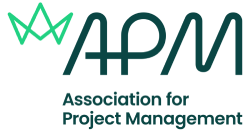Course Description
The APM Project Management Qualification course follows the syllabus provided by APM, which is built around the APM Body of Knowledge 6th edition. The course provides delegates with a detailed understanding of the underpinning tools, techniques, and principles that are fundamental to successful project delivery.
Course Materials
All delegates enrolled on virtual course bookings receive a hard copy of course materials sent to a preferred postal address.
Target Student
This course is intended for project managers and aspiring project managers with at least two years of project experience.
Pre-requisites
Delegates should have experience working in a project environment and have a basic understanding of project management issues.
Pre-Course Reading
This is an intensive five-day course and delegates will be expected to undertake around 15 hours of pre-course work in order to be fully prepared.
Delegates will be provided with pre-course reading by email prior to attending the course. Success on the course will be enhanced by close attention to the pre-reading materials.
Performance-Based Objectives
Delegates will learn how to:
- Describe the management structure by which projects operate
- Explain the structure of project lifecycles
- Examine contexts and environments in which projects are delivered
- Define governance of project management and the use of structured methodologies
- Plan and manage communication in the project environment
- Explain principles of leadership and teamwork
- Recognise the importance of stakeholder management
- Apply project management planning for success
- Describe project scope management
- Define and develop scheduling and resource management
- Prepare for effective project procurement
- Apply risk management, quality management and issue management
- Recognise the links between configuration management and change control
Course Content
The course is intensive and therefore delegates are expected to undertake revision work in the evenings to prepare for the examination that will be taken at the end of the course. The additional work required during evenings will comprise consolidation reading and mock examination questions. The evening work is integral to the course and delegates should expect to spend two to three hours each evening on these activities.
Contexts and environments in which projects can be delivered
- Organisation, sponsorship, infrastructure
- Life cycle models, extended life cycle, phases and stages
- Operations management, programme management, portfolio management, project environment, Health and Safety
- Governance of project management, role of structured methods in project governance
Communication within project management
- Importance of effective communications, communications within projects, communications plan
- Conflict management, negotiation
- Leadership, motivation, leadership styles
- Characteristics of teams and teamwork, creation, development and management of teams
Planning for success
- Use and contents of the business case, benefits management, investment appraisal
- Information Management
- Planning process, project management plan, estimating techniques
- Stakeholder management
- Project control
- Scope management, requirements management, configuration management, change control
- Time scheduling, Critical Path Analysis, Gantt charts, resource scheduling, Resource Smoothing and Levelling
- Budgeting and cost control
Specific Techniques
- Procurement in projects, procurement strategy, contracts and contractual relationships, provider selection and management
- Risk and issues, risk management and issue management processes, delegation and escalation
- Quality Management, quality planning, quality control, quality assurance, continual improvement, quality reviews
The APM Project Management Qualification Examination
Extensive examination practice and feedback are included in the workshop. The APMP examination is normally scheduled for 13:00 on the final day of the course.
Key exam information:
- 3 hours duration
- Closed-book
- 10 essay-based questions to be selected from a total of 16. Each worth 50 marks
- Candidates are required to achieve a minimum of 275 marks out of 500 (55%) to pass

